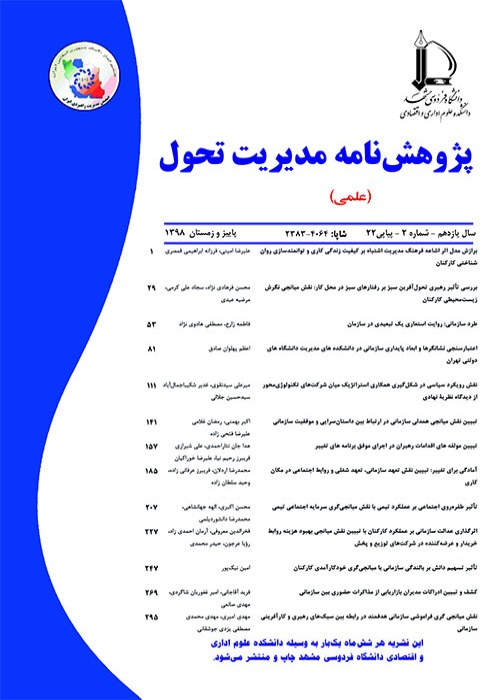Designing a model for self-leadership based on instructions of holy quran and nahj al-balaghah
The self-leadership concept is a popular topic in leadership and management studies, which has attracted a lot of attention during the past few decades. the purpose of the present study was to develop a comprehensive model to explain the dimensions of self-leadership based on instructions in the holy quran and nahj al-balaghah. in other words, it was to look at the concept of self-leadership based on islamic teachings to extract the effects of different cultural and religious conditions.
Self-leadership is a process of behavioral and mental strategies through which individuals influence themselves to control and manage their behaviors. while self-leadership is closely related to concepts such as the need for success, self-regulation, and self-control, it should be considered as an independent concept. therefore, it may have outcomes different from that of similar concepts. this concept is developed based on four theories of self-regulation, self-management, social cognition, and intrinsic motivation. previous studies identified three distinct but complementary strategies for self-leadership including the behavioral, natural reward, and thought-building strategies.
This was a mixed-methods study. in the qualitative phase, it has interviewed a number of experts, and based on thematic analysis it extracted the dimensions of self-leadership. in the quantitative phase, it has utilized structural equation modeling to validate the findings of the previous phase. the qualitative sample was comprised of 17 experts in different fields of islamic management (such as quranic and nahj al-balaghah sciences) selected by conducting purposeful sampling. the participants in the qualitative phase have revised and confirmed the final codes, themes, and model. in the next phase, to test the research hypotheses, quantitative data was gathered from a sample size of 300 encompassing the managers of entekhab investment development group using a researcher-made questionnaire.
RESULTS & DISCUSSION
First, self-leadership and its relevant concepts were studied from the viewpoint of holy quran and nahj al-balaghah. according to the initial analysis, 1,536 and 435 codes were respectively extracted from holy quran and nahj al-balaghah. after summarizing these initial codes in three stages, 214 secondary codes emerged that were classified into 79 sub-themes and 20 themes. these themes were finally categorized into four categories called self-leadership antecedents, main concept, strategies, and results. themes included recognizing oneself, recognizing god, recognizing the opponents and enemies, recognizing the environment and surroundings, activating perceptual inputs, creating internal affecting factors, creating external affecting factors, and understanding the necessity of self-leadership were the eight antecedents of self-leadership. the main-concept of self-leadership encompassed the five themes of self-assessment, self-motivation, self-challenging, self-improvement, and self-protection. four strategies of mental, behavioral, mental-behavioral, and ethical were identified as self-leadership strategies. and finally, it was determined that self-leadership outcomes encompass three categories of life, the afterlife, and life-afterlife results. quantitative findings revealed that both the antecedents and strategies of self-leadership positively affected the main concept of self-leadership with a coefficient of 0.97. the main concept also positively affected the self-leadership results with a coefficient of 0.89. since the literature on self-leadership is limited to strategies and results of self-leadership, it should be noted that the findings on its antecedents and main concept cannot be completely interpreted by literature. the findings on self-leadership strategies and results, however, are consistent with the existing literature.
Based on obtained results, it is suggested that individuals especially managers must first manage themselves. the managers need to establish the prerequisites of self-leadership in themselves and simultaneously utilize its strategies to benefit from the mentioned results. it should be noted that since the self-leadership strategies positively affected its main concept on the one hand and the main concept affected the results on the other, it is not far-fetched the positive effect of strategies on results. this issue is in line with the existing literature. in terms of directions for research, it is suggested that future researchers approach the other leadership concepts such as authentic, inspirational, charismatic, pragmatic, and transformational leadership from the viewpoint of islamic teachings and expand these concepts in models based on the value system of islam.
- حق عضویت دریافتی صرف حمایت از نشریات عضو و نگهداری، تکمیل و توسعه مگیران میشود.
- پرداخت حق اشتراک و دانلود مقالات اجازه بازنشر آن در سایر رسانههای چاپی و دیجیتال را به کاربر نمیدهد.



